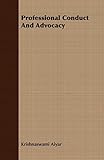Professional conduct and advocacy : Being a series of lectures delivered to apprentices-at-law
Publication details: Oxford Oxford University Press 1945Edition: 3rdDescription: 206pISBN:- 9781406747096
- 340.028000 AIY
| Item type | Current library | Call number | Status | Date due | Barcode |
|---|---|---|---|---|---|
 BOOKs
BOOKs
|
National Law School | 340.028 AIY (Browse shelf(Opens below)) | Available | 31392 |
Browsing National Law School shelves Close shelf browser (Hides shelf browser)
Overview
PROFESSIONAL CONDUCT - AND ADVOCACY PROFESSIONAL CONDUCT AND ADVOCACY being a series of lectures delivered to apprentices-at-law BY K. V. KRISHNASWAMI AIYAR Advocate, High Court, Madras WITH FOREWORDS BY SIR MAURICE GWYER Formerly Chief Justice of India AND SIR LIONEL LEACH Chief Justice, High Court, Madras HUMPHREY MILFORD OXFORD UNIVERSITY PRESS FOREWORD TO THE SECOND EDITION I AM very glad that a second edition of Rao Bahadur K. V. Krishnaswami Aiyars most admirable book is to appear, and it gives me great pleasure to contribute this Foreword U it. I remember that when a copy of the original edif 8ft firS came into my hands and I began to read it, I found that I could not lay it down until I had read it right through and I do not doubt that many others could say the same. The new edition is even better than the old. It is a book which should be in the hands of every law student and young practitioner and many older practitioners would derive much profit from studying its pages. Here is to be found information and advice of the greatest practical value united with a lofty idealism. The standards on which the author insists are high and exacting but neither too high nor too exacting for a profession which is an essential part of the administration of justice. He concedes that of late the profession has, as he puts it, lost much ground, though he is unwilling to discuss the reasons which have led to this. That his statement is only too true admits, I fear, of no dispute and the value of books like this, in Avhich young men who are about to enter, or who have just entered, the profession are reminded of the duties and responsibilities of a lawyer, is that they reassert standardssometimes in danger of being forgotten. I have heard Indian friends of my own, themselves distinguished lawyers, deplore in no uncertain terms this lowering of standards and it seems clear that one cause of it at least is the great overcrowding of the profession and the struggle for existence among its less fortunate members, since the weaker brethren are thereby exposed to temptations which they are not always able to resist. This is a matter which affects the public as well as the profession itself for any diminution in the respect felt for lawyers as a whole must affect prejudicially the whole administration of justice. It is therefore worth while to consider whether there is any effective means of preventing these excessive numbers. I think that all would regret any artificial restriction on entry into the profession, which might have the effect of vi FOREWORD TO THE SECOND EDITION making it a preserve for the well-to-do and shut out young men of small means but great promise. I have, however, often thought that it is too easy at the present time to become a lawyer and that the standards of law examinations are in many cases far too low. To raise those standards and thus to ensure that only properly equipped young men are able to enter the profession would, as it seems to me, be not only a legitimate but an extremely beneficial step. Nor do I think the teaching of law in India is all that it might be, and I should like to see some united effort among the different law schools with a view to its improvement generally. The High Courts might them selves play a very useful part in this. A learned friend and former colleague of mine has often reminded me that English rules cannot beapplied without qualification to India, where conditions are different. That is of course true, for in England the professions of barrister and solicitor are distinct and each has its own code and rules of professional conduct...




There are no comments on this title.